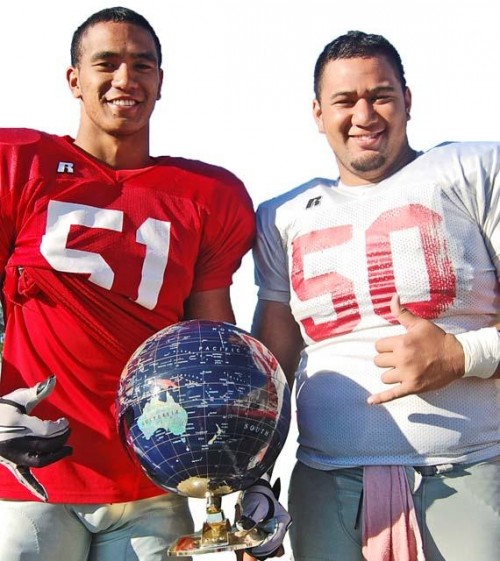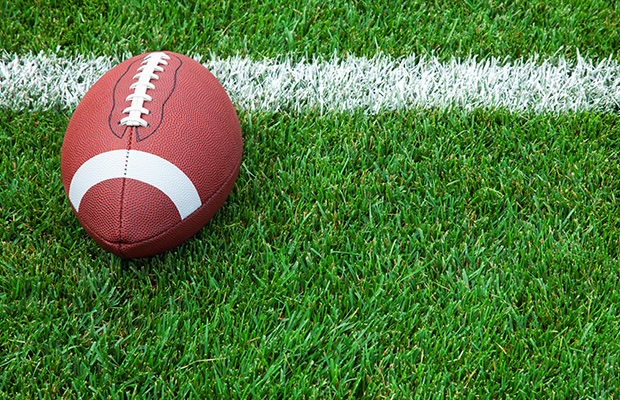
Rufus Paul Naquin
September 13, 2011Thelma Marie Daigle Davidson
September 15, 2011With a colorful globe spinning around their football taped fingers, Nicholls State seniors Pio Adams and Pa’a Kamauoha suddenly realize just how far away from home they actually are.
“Somewhere around here,” Adams says dragging his right index finger across the globe’s blue Pacific Ocean.
As Adams struggles to find the precise location amidst the world’s largest ocean, Kamauoha locates the mark, the apple of both men’s eye.
“No, no, it’s right here,” Kamauoha adds, pointing to the spot, like it’s an X on a treasure map.
“Yes, that’s it,” Adams adds. “Right there, that’s where we’re from.”
The spot both men are now pointing to are the Hawaiian Islands, the place where the duo were born and raised.
Now in little ole Thibodaux, the Colonels seniors tout they are bringing a taste of Hawaii to the team, both on and off the field.
“The biggest difference is obvious, we are thousands and thousands of miles away from home,” Adams says with a laugh. “But we’re making the most of it. We’re bringing a little Hawaii here and taking a little bit of Louisiana back with us, as well.”
Hawaii’s Aloha into Football
Adams is from Nanakuli, a small town on the west side of the island of Oahu.
Kamauoha is from the same island, but he resides from the land mass’s eastern end in a town called Waimanalo.
To vacation from Thibodaux to Oahu, one would have to travel 5,500 miles.
“It’s many thousands,” Adams said. “I know that much.”
Hawaii’s roots as an American state date back to the late 1950s.
But football was born on the island well before the band of islands became a state.
Colonels’ assistant coach Keith Uperesa knows that better than anyone.
He, too, is from the country’s 50th state, having grown up in Honolulu.
He said that while there are differences in lifestyle and cultures between Hawaiians and people in the mainland, one thing is universal among Americans, football.
“Oh yeah,” the coach quickly says when asked if the sport is fully developed in his home state. “It’s been out there since the 40s and the 50s. It’s nothing new. The people love it.”
Because of the sport’s popularity, both Adams and Kamauoha begun playing at a young age before progressing to the prep level.
While there, both players excelled.
Adams was an All-State performer on both the offensive and defensive lines at Anuenue High School, while Kamauoha was a First-Team All-Conference selection at nearby Kaiser High School as a safety.
With a handful of collegiate offers, the players decided to team up, opting to enroll in Walnut, Cali., at Mt. San Antonio Community College.
Island Boys Gone Bayou
Nicholls State football coach Charlie Stubbs isn’t unlike most coaches across the country.
He likes tough players. He also likes players who play hard.
Once Stubbs finds players with those traits, he also appreciates players who are respectful to coaches and teammates.
Throughout his career, the Colonels coach said he’s noticed one group of student athletes who almost always match those traits, players with Polynesian backgrounds.
Stubbs coached his share of Hawaiian student athletes during his career, which has spanned west-coast programs like BYU, Oregon State and UNLV.
Because of that and his ties to the island from Uperesa, the coach said he wanted to explore recruiting the islands when possible throughout his tenure at Nicholls.
“Kids from around there play with so much energy and so much heart,” Stubbs said. “They play with emotion. They play with family in mind, all of those things are important to kids out there. They are loyal. They are very loyal to the program, always. … We definitely always appreciate when we get the opportunity to get a player from in that area.”
“That toughness comes from the physical nature of our culture,” Uperesa said. “Our culture has a strong family base, so there’s a strong sense of ownership and pride among people in the things they represent.”
The pipeline Stubbs envisioned began chugging with Adams, who built on his prep success and emerged as one of Mt. San Antonio College’s leading lineman in his sophomore year, recording 48 pancake blocks.
Many of those pancakes got on the TV screen of Uperesa, as the sophomore made a recruiting tape and distributed it across the country.
When Kamauoha found out Adams was being recruited by Nicholls, he also sent a tape to Uperesa.
“They found Pio, so I got my things together to send just in case they needed a safety, too,” Kamauoha said. “I guess they liked what they saw.”
That became apparent as both teammates were offered scholarships to Nicholls, offers they accepted, putting the Hawaiians en route to Louisiana.
It was a trip they admit had them antsy initially.
“Louisiana?” Adams asks rhetorically. “I didn’t even really know too much of where that was, honestly. I really didn’t know what to expect.”
“We’re a far, far distance from home,” Kamauoha said. “Sometimes I catch myself just thinking like, ‘Man, I can’t believe I’m in Louisiana.’ It’s an unbelievable journey.”
Being adopted as Cajuns
There are obvious differences between the Hawaiian way of life and Louisiana culture.
“Phew, it’s way different,” Adams said.
The biggest difference, the players say is climate.
In Louisiana, summer temperatures rise upwards of 110 degrees. When winter rolls around, it could sometimes be in the 40s.
“Right now in Hawaii, it’s probably about 77,” Adams said, still sweat drenched from a warm practice. “It’s always 70-to-80. It never really changes too much.”
“And the wind, don’t forget that,” Kamauoha adds quickly. “The breeze keeps it cool.”
Another difference is the cuisine, although the players aren’t complaining about that, not anymore, anyway.
On the islands, the food is heavily influenced by those of Asian cultures and includes fish, sushi, tropical fruits and an assortment of rice dishes. In Louisiana, the diet is more European, which features more meats and cheeses.
The players say the transition wasn’t an easy one at first and they still do love their Hawaiian cuisine.
But make no mistake about it, they’ve learned to pig out the Cajun way.
“The gumbo, the jambalaya, all the fried foods, yeah, I like that stuff,” Adams said with a laugh, rubbing his offensive lineman stomach. “I didn’t like it at first, but now, because I didn’t really like spicy stuff. Now, I catch myself putting the hot sauce on my plate whenever I’m eating and it’s like, ‘What the heck has happened to me?'”
Away from the cultural differences, the Colonels say one thing unites home and Louisiana, the kindness of the people.
Hawaii is a beach state where people go to kick their shoes off, relax and get away from so-called “real-life struggles.”
In Louisiana, the same, ‘Laissez les bon temps roulez,’ attitude exists.
Having that in place has been crucial to the players and even Uperesa being able to ease into their new digs.
“The people are just like at home, nice, comforting,” Adams said. “Everything’s relaxed.”
“That’s what’s so inviting about the South,” Uperesa said. “It’s a slow pace. It’s a very slow style of living. It’s very similar to what we experience on the islands. It really makes the transition much easier.”
When the going gets tough and homesickness sinks in, Nicholls has a plan to keep the boys happy.
Uperesa said he and his wife have opened their doors to both players anytime they need family support.
From that, he’s called upon other friends around the area who are looking out for the players emotionally if they ever need a boost.
Kamauoha has family in Belle Chasse, which also eases any tensions that are inevitably going to arise when a college student is thrust more than 5,000 miles from home.
“We give these guys a sense of home within our home,” Uperesa said. “It’s natural for the Polynesian culture to assume the family position amongst one another. That’s what we do. We’d do that with any other kid who would be here. … We have close family friends from Morgan City who have embraced these kids and who have made these boys into their nephews.
“It doesn’t matter where they go or what they do, the guys know that they don’t have to look far to find a sense of home.”
So far, so good, no one has qualms about making the trek.
“It was a great decision,” Adams said.
“I love it here,” Kamauoha added.
Going out on top
Like all other Colonels, Adams and Kamauoha are a part of a remodeling process within the Nicholls program.
“We were recruited here to be a part of building something,” Adams said. “To try and have a hand in something special.”
Kamauoha is currently a starting linebacker for the Colonels, while Adams is one of the team’s top reserve offensive linemen.
In the season opener, Kamauoha recorded six tackles, good enough for second on the team.
Adams didn’t play, but his number will sure be called soon, as he logged several starts last season.
The players share the team’s goal, which is to win the Southland Conference.
More than the food, the culture and the climate, that is the main focus on the players’ minds each day.
“We want to win conference,” Kamauoha said. “We want to experience how good it’d feel to win that championship. I know that we can do it.”
From there, the Cajun Hawaiians also have other plans.
The game has taken them from home to California to Louisiana. Why not professional?
Football has taken the two this far, why can’t the ride continue?
Keep the globe handy, who knows where these Colonels will call home next.
“The game’s taken us from home to hundreds of miles away to California to thousands of miles away to Louisiana,” Kamauoha said. “What’s next? Who knows? Maybe we’ll hit the East Coast or something next. We just love to play. We’ll be happy to go wherever the wind takes us.”
Nicholls State seniors Pa’a Kamauoha (left) and Pio Adams pose with a globe following a practice this week. The Colonels’ globetrotting duo are from Hawaii, a pipeline Nicholls hopes to continue to explore. CASEY GISLCAIR
















